Bengoa report: Busting the jargon
- Published
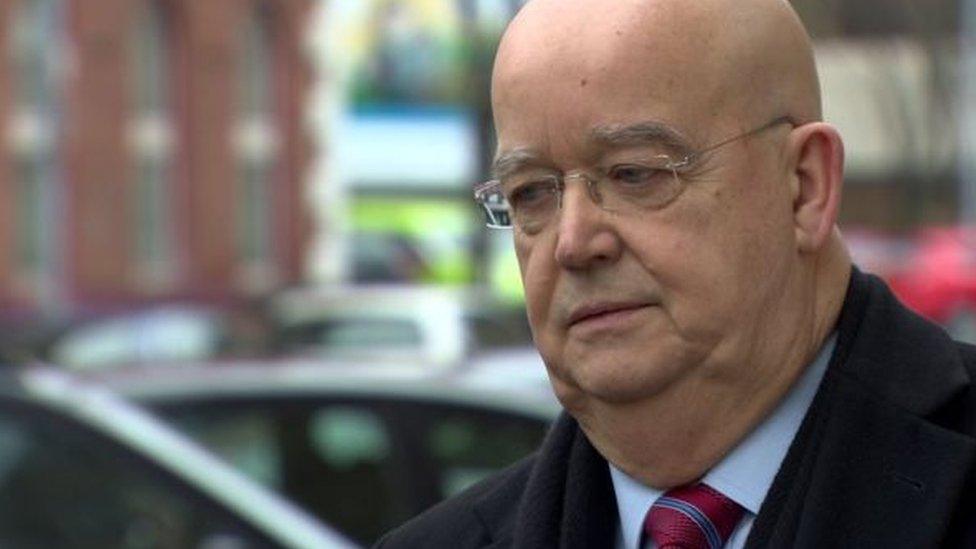
Dr George O'Neill is a GP in west Belfast
The Health Minister, Michelle O'Neill, has outlined a 10-year plan, external to make Northern Ireland's health and social care system fit for the 21st Century.
Its 18 time-specific action points are based on 14 recommendations from a government-appointed panel., external
The Bengoa Report includes phrases such as "accountable care systems" and "elective care performance". But what do they mean?
We asked Belfast GP, Dr George O'Neill, to simplify the report's recommendations.
"We are at a crossroads with regard to health and social care, where we have political leadership willing to take on the challenge and have the courageous conversations with their electorate," Dr O'Neill said. "The emphasis being on a patient-centred service delivering improved outcomes for our populations."
Recommendation One
The panel recommends using the dimensions of the Triple Aim as a framework for reform, including an increased emphasis on the experience of those who deliver care.
Dr George O'Neill: "The panel is recommending that we look at population health instead of individual health, based on the Institute for Healthcare Improvement, external (IHI) and their Triple Aim framework. Triple Aim means three things: improved patient experience, improved health of populations and reduced cost."
Recommendation Two
The panel recommends that the HSC (Health and Social Care) should move to: Formally invest, empower and build capacity in networks of existing health and social care providers (such as Integrated Care Partnerships and the developing GP Federations) to move towards a model based on Accountable Care Systems for defined population based planning and service delivery; and, regionalised planning for specialist services.
Dr George O'Neill: "This looks at what we have already which are GP Federations and developing a system based on some US accountable care organisations."
Recommendation Three
The panel recommends that the HSC should continue its "positive work" and there should be particular focus on the three key areas of workforce, eHealth and integration.
Dr George O'Neill: "This is to continue what we are doing but to empower those developing health and social care, such as nurses and pharmacists, to deliver the skills they are capable of offering. There is a new approach to purchasing - the death of the purchaser/provider split."

Wordcloud of the 87-page Bengoa report
Recommendation Four
The minister should create, communicate and lead a clear, powerful, long term vision for the Health and Social Care system as a first step in the implementation process.
Dr George O'Neill: "It is clear that the ministers and politicians should have a long-term vision of the local health and care system that we require. By accountable care services, they mean there will be more cooperation with all those across the health and social care family. They will have a budget to deliver outcomes and they will be accountable for that budget, which is a big change."
Recommendation Five
The panel recommends that plans, costs and timescales for introducing recommendations on areas such as population health and patient care, should be prepared within the next 12 months.
Dr George O'Neill: "They are suggesting we look at population health and risk stratification. Which means targeting those at the greatest risk and who will get the greatest benefit from any identification. You get the facts and figures before you move forward. It mentions the importance of developing new systems."
Recommendation Six
Many of these recommendations will require additional, transitional funding. The panel recommends that the minister should establish a ring-fenced transformation fund.
Dr George O'Neill: "You need seed money to start the whole process of transformational funding and it must be properly resourced."
Recommendation Seven
The panel recommends the creation of a transformation board, supported by the department, linked to the executive's health and well-being strategy. This board would set the mid-term strategy, oversee the transformation process and would be tasked with creating the right conditions for the local system of care to develop successfully. It should help to transform organisational structures and management processes by promoting local decision making, local innovation and scaling up of best practices among the local systems of care.
Dr George O'Neill:"The panel recommends a transformation board being created and that it is linked to the Stormont executive's health and wellbeing strategy."
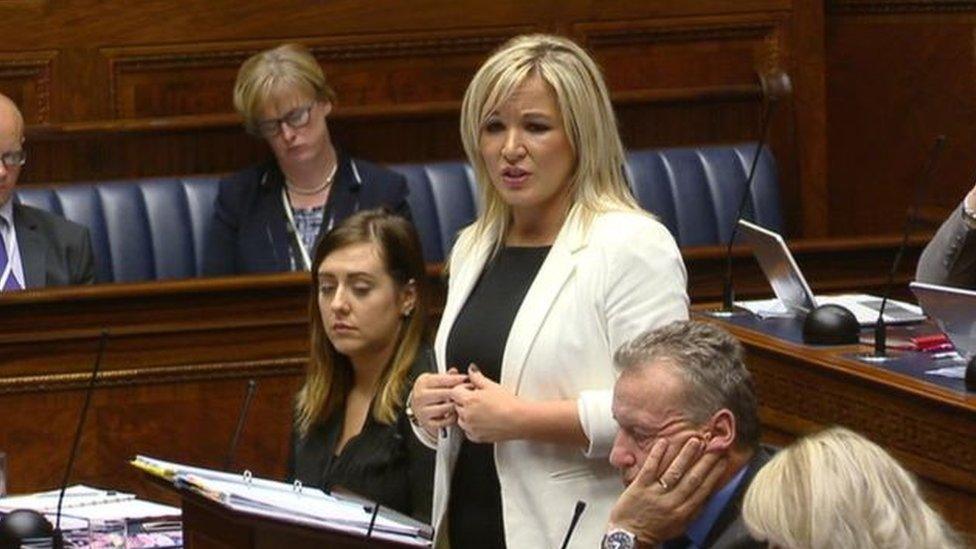
Michelle O'Neill has called for a "wholesale transformation" of Northern Ireland's health system
Recommendation Eight
The system should identify and scale up at least two innovative projects per year where there is clear evidence of improved outcomes for patients or service users.
Dr George O'Neill: "It is self-explanatory, there should be at least two innovative projects per year where there are clear outcomes for patients. That is common sense."
Recommendation Nine
The minister should adopt a continuous improvement methodology to support the reform of health care towards local systems of care. To make this actionable, it is necessary to continue with plans to create stronger quality improvement systems. While the exact remit for this will need to be decided by the minister, the panel feels that it should be locally owned and tasked with providing support and intelligence to enable new projects at the provider level.
Dr George O'Neill: "They are talking about continuous improvement. What it means, in essence, is you look at what is happening regarding specialism. You concentrate on placing the specialism with high volumes where people can hone their skills with appropriately-trained staff to deliver improved and better outcomes. You must ensure the public are involved and have an understanding of what is happening."
Recommendation 10
The minister takes steps to address elective care performance. However, while this is important, it should not be allowed to overshadow the need for long term transformation.
Dr George O'Neill: "They are saying that waiting lists should not overshadow, drown out or slow up the transformation."
Recommendation 11
At the strategic leadership level, the HSC should:
Foster new system leaders by protecting and empowering clinical leaders who take on leadership roles.
Analyse and eliminate regulatory obstacles which may get in the way of implementing the new networked local health and social care organisations.
Take the formal decision to empower leadership close to the front line.
Dr George O'Neill: "This is about leadership, organisational and cultural change. How do you change a culture of an organisation set in concrete since its inception? To do this, everyone will have to change the way they behave - this includes GPs, pharmacists, community care and secondary care."
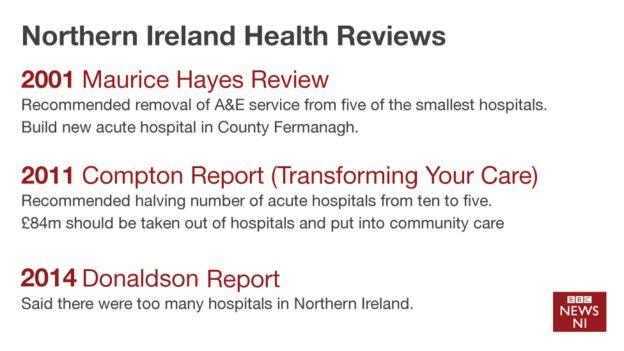
There have been three other reports into Northern Ireland's health care service since 2001
Recommendation 12
The HSC should consider whether there needs to be a platform for a more open and immediate conversation with staff and service users.
Dr George O'Neill: "How do you sell this to staff and service users? You have to be open transparent and inclusive, things must not happen suddenly."
Recommendation 13
The panel recommends, external that the department should formally endorse the criteria and apply them to five services each year to set out the future configuration of services to be commissioned (or not) from the Accountable Care Systems. If applying the criteria leads to the conclusion that the service is vulnerable, plans for reconfiguration should be developed and actioned within this 12-month period.
Dr George O'Neill:"Accountable care systems will need to be properly funded, staffed and skilled up."
Recommendation 14
The identification of a senior leader to lead this process at a regional level. This process should be collaborative and inclusive and based on the criteria above.
Dr George O'Neill: "A senior decision maker to be in charge of the day-to-day running and all operational matters regarding health and social care. If this is set up properly it will mean politicians will not micro-manage.
"The example I would use is the policing board where the Police Service of Northern Ireland chief constable is in charge of operational matters - you can put the fire to his feet, but you cannot overrule him."
- Published25 October 2016

- Published25 October 2016
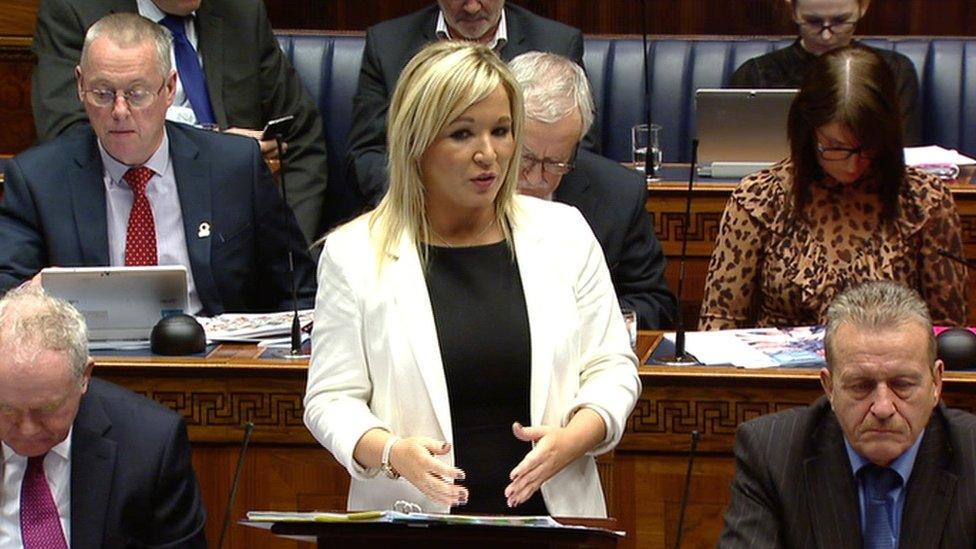
- Published25 October 2016

- Published25 October 2016
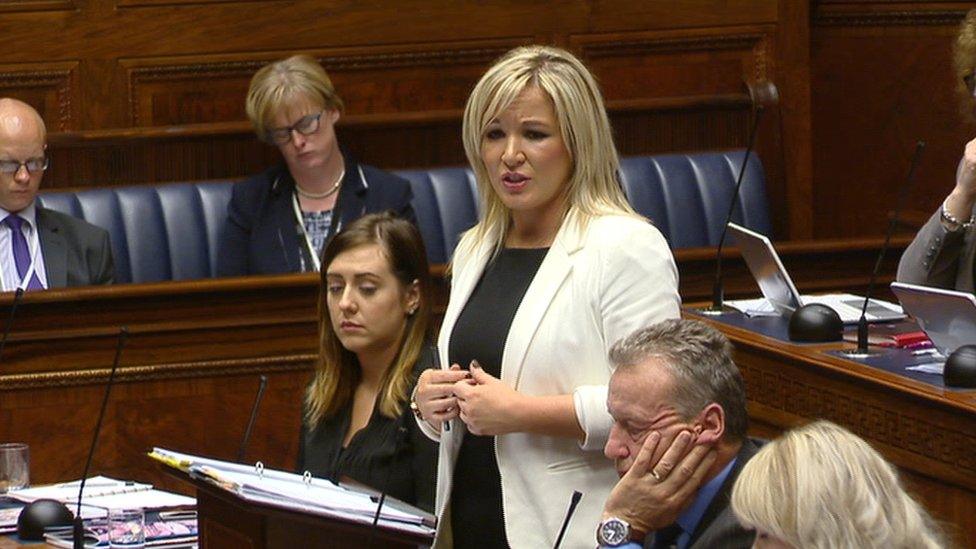
- Published4 September 2015
